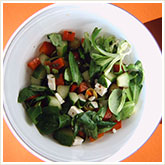Diet, Exercise, and Your
Kid's Grades By Steve Edwards
From Team Beachbody - Click here for resources, tools and
information to help you to reach your health, fitness and positive lifestyle
goals!
There's a lot more you can do for your kid's
education than locking him or her in a bulletproof SUV and waiting in a
smog-choked line of other SUVs to drop him or her off at the school steps.
Teaching proper eating habits and providing time for exercise will do more for
your child's potential to excel than anything else.

Unfortunately, you may not get support from
your school in these matters. Lack of funding and programs like the ill-named
"No Child Left Behind" are making it more and more difficult for your kid to
eat well and exercise properly at school, rendering your parenting decisions
more vital than ever before.
Exercise
A growing body needs exercise to develop
properly. There's no science to dispute this, yet schools have begun to cut PE
classes. This not only makes it harder for children to concentrate on classwork
during the day, but it's a leading cause in the childhood obesity epidemic
that's sweeping the nation. "Over the last 25 years, caloric intake in toddlers
and young kids has gone up three or four percent, but the level of physical
activity has dropped nearly 20 percent to 25 percent," says Ken Reed, Director
of the Center for the Advancement of Physical Education.
 When I was in school, I had five recess periods, and my memories
are of swarms of kids charging all over our exercise fields. In a survey of
parents, I found that most kids had three or less periods of PE these days.
Plus, it's becoming increasingly rare to walk to school, something that
provided me and most of my classmates hours of random muscle-building,
calorie-burning activity 5 days per week.While there are plenty of studies that
show the connection between physical fitness and academic performance, it's
still a challenge for school administrators who feel they must focus on
academics. One researcher, Dr. John Ratey of Harvard, does brain research on
physical fitness and calls physical activity "miracle growth for the brain."
Despite this, it's still an uphill battle. When I was in school, I had five recess periods, and my memories
are of swarms of kids charging all over our exercise fields. In a survey of
parents, I found that most kids had three or less periods of PE these days.
Plus, it's becoming increasingly rare to walk to school, something that
provided me and most of my classmates hours of random muscle-building,
calorie-burning activity 5 days per week.While there are plenty of studies that
show the connection between physical fitness and academic performance, it's
still a challenge for school administrators who feel they must focus on
academics. One researcher, Dr. John Ratey of Harvard, does brain research on
physical fitness and calls physical activity "miracle growth for the brain."
Despite this, it's still an uphill battle.
"The situation isn't good and it's getting
worse," says Reed. "Physical activity levels have dropped dramatically in the
last 25 years and we believe there's a direct link there to childhood obesity,
as well as a dramatic increase in type 2 diabetes, high blood pressure, and
cholesterol levels in children. It's primarily because of budget problems in
schools. Also, the focus is on the educational assessment test that almost
every state has due to No Child Left Behind and other factors. It's become the
scorecard for administrators and teachers. The focus is on reading, writing,
and arithmetic. Parents are also picking up on the state assessment scores as
their scorecards on how their school's doing, so they put more pressure on
schools to focus on those areas. Something's got to give, and it's usually PE,
music, and art classes."
Diet
Then there's your child's diet to consider,
which most likely won't be improved at school. According to statistics cited in
Eric Schlosser's book, Fast Food Nation: The Dark Side of the All-American
Meal, the worst-quality food goes to fast food restaurants, schools, and
pets, in that order—a pretty scary thought when we consider that fast
food restaurants and the school cafeteria make up a large percentage of what is
forming the dietary pattern of our future generation.
 It's
easy to see the food/performance relationship in schoolkids. One example,
Appleton Central Alternative High School in Appleton, Wisconsin, implemented a
health-food program in 1997 and saw a dramatic increase in student performance.
By removing soda and candy machines, and changing the cafeteria fare from the
standard burgers, fries, etc., to salad, veggies, whole-grain breads, fresh
water, and healthy recipes, they saw grades go up, truancies go down, and
disciplinary matters nearly vanish. It's
easy to see the food/performance relationship in schoolkids. One example,
Appleton Central Alternative High School in Appleton, Wisconsin, implemented a
health-food program in 1997 and saw a dramatic increase in student performance.
By removing soda and candy machines, and changing the cafeteria fare from the
standard burgers, fries, etc., to salad, veggies, whole-grain breads, fresh
water, and healthy recipes, they saw grades go up, truancies go down, and
disciplinary matters nearly vanish.
"I don't want to say better than ever,
because it's always worked," said dean of students Greg Bretthauer recently,
"but we've made minor revisions, based on experience, to improve it. We've
incorporated flaxseed and focused on the omega content of foods. Made fresh
water even more available. We have monthly fruit smoothie days, and have really
worked to incorporate more education about eating away from school—trying
to get students to follow through at home. We've found the diet does play a
major role in increasing the ability to concentrate."
Adds teacher Mary Bruyette, "If you've been
guzzling Mountain Dew and eating chips and you're flying all over the place, I
don't think you're going to pick up a whole lot in class. Now I don't have to
deal with daily discipline issues; that just isn't a factor here." While
there's little doubt that better food would increase scholastic performance,
there's also little chance it's going to happen on a wide scale anytime soon.
"Our district is so strapped for cash that all they can look at is the bottom
line," states Reed Bartlett, a teacher in the Riverside, California school
district. So we get cheap, low-quality food, and I don't see it changing
anytime soon.
Weird science
It probably doesn't help that there's always
a study out there for someone to fall back on and say things like "see, it
doesn't matter what the kids eat." Case in point is the infamous "sugar study"
that concluded that diet played little to no role in children's behavior.
Since I can say with 100 percent certainty
that I've never had a client who wasn't affected by what he or she ate, I'm
pretty sure not many people will disagree with me that food can alter the way
you feel, which can alter your behavior. Yet according to Steven Pliszka, MD
and professor of psychiatry at University of Texas Health Science Center at San
Antonio, "The biggest myth of all is that food has any connection to behavior."
Say what?
 And there's more where that came from. Wesley Burks,
MD, professor and chief of pediatric allergy and immunology at Duke University
Medical Center states, "There haven't been any good scientific studies that
show that there is an adverse effect on a child or adult's behavior chronically
with the ingestion of foods." Perhaps not, but there's at least one school with
thousands of real-world examples of diet playing a major role on behavior. In
fact, the Appleton school tried an experiment where they served nothing but
sugar-laced foods, caffeinated beverages, foods prepared with palm oils, etc.,
like "normal schoolkids get," and it had a significant effect. According to
Bretthauer, "They ran around like hyped-up squirrels, felt sick, couldn't seem
to concentrate. 'Pleeease,' they said. 'Don't have another one.'" And there's more where that came from. Wesley Burks,
MD, professor and chief of pediatric allergy and immunology at Duke University
Medical Center states, "There haven't been any good scientific studies that
show that there is an adverse effect on a child or adult's behavior chronically
with the ingestion of foods." Perhaps not, but there's at least one school with
thousands of real-world examples of diet playing a major role on behavior. In
fact, the Appleton school tried an experiment where they served nothing but
sugar-laced foods, caffeinated beverages, foods prepared with palm oils, etc.,
like "normal schoolkids get," and it had a significant effect. According to
Bretthauer, "They ran around like hyped-up squirrels, felt sick, couldn't seem
to concentrate. 'Pleeease,' they said. 'Don't have another one.'"
Scary science
Your kid has a lower life expectancy than
you, which is one of the most alarming statistics I've seen recently, if not in
my lifetime. And that's the big-picture stuff. On a smaller scale, we see
studies on the negative effects of many things associated with the daily lives
of children.
Kids are drawn to bright colors, so
marketers love to change the way food looks—just look at any chain
restaurant's kid menu for examples. Yet eating foods with artificial colors and
preservatives can cause negative behavior changes in children, according to a
recent study published in the Archives of Diseases in Childhood. And
that's just one. In a new review of two dozen scientific studies, the nonprofit
Center for Science in the Public Interest (CSPI) contends that food dyes and
certain foods can adversely affect children's behavior. CSPI, in a 32-page
report titled "Diet, ADHD, and Behavior," charges that federal agencies,
professional organizations, and the food industry ignore the growing evidence
that diet affects behavior.
And with researchers like Mina Dulcan, MD,
head of child and adolescent psychiatry at Children's Memorial Hospital in
Chicago, it's hard to argue. She states, "The bottom line is that too much
artificial food stuff isn't good for you, but I don't think you can believe
that it's going to hurt your child's behavior or learning very much." Yet in
order for her statement to make sense, we would have to conclude that nothing
you eat makes any difference in how your body responds. We know this to be
false, making this statement—from a prominently credentialed
professional—unequivocal nonsense.
It makes a lot more sense to listen to Reed,
who states, "The country's decline in fitness levels, of adults and children,
is negatively impacting productivity. This generation of kids is the first in
100 years to have a lower life expectancy than their parents. Fitness levels,
as well as health issues like diabetes and high blood pressure, are much worse
trend-wise than we've ever seen with teenagers and young children. The economic
cost just in terms of health care costs is going to be dramatic. Then, when you
factor in the loss in productivity, it's really going to be dramatic for our
country if it's not turned around." What can you do?
 Plenty. This isn't a red tape or lawmaker's
issue. While those are factors, you are still the primary influence on your
child's health. For one, make sure your child has plenty of opportunities to
exercise. The upside to the decline of PE is the availability of affordable
extracurricular sporting activities. While your doctor may tell you that you
can exist on 30 minutes of exercise three times per week, that ain't going to
cut if for a healthy child. Kids need exercise and movement, and a lot of
it. Plenty. This isn't a red tape or lawmaker's
issue. While those are factors, you are still the primary influence on your
child's health. For one, make sure your child has plenty of opportunities to
exercise. The upside to the decline of PE is the availability of affordable
extracurricular sporting activities. While your doctor may tell you that you
can exist on 30 minutes of exercise three times per week, that ain't going to
cut if for a healthy child. Kids need exercise and movement, and a lot of
it.
Get 'em out there. "Even with the diets kids
are getting in schools, if the kids were more active, they'd be better off,"
says Reed. But you're also a major contributor to your child's diet, which
begins at home. If your school won't provide healthy meals, go on strike and
utilize a lunch box. And remember that schools, both public and private,
respond to public demand. Politicians do too. Just because school menus are
dismal, and schools are cutting PE and losing funding doesn't mean this is the
way of the future. If enough people demand that it changes then it will.
Also, lobby government agencies and
politicians. We live in a democracy. Take advantage of your rights.
"The Department of Health and Human Services
should withdraw its printed and Internet documents that largely dismiss the
effect of food ingredients on behavior. For starters, the FDA should halt
distribution of a pamphlet on food additives that it co-published with an
industry group, the International Food Information Council," said Michael F.
Jacobson, executive director of CSPI. "It's high time that the
government—as well as doctors—provided the public with accurate
information that might help many children."
The solution is for each one of us to keep
trying. One person can—and always has—made a difference. Because
one turns into two, which turns into three, and pretty soon you have an army on
your side demanding change. "If we could just get the soccer mom phenomenon
working on physical education, we could rally parents and that would be a great
advantage," says Reed.
Related Articles
"We
Are What We Eat"
"Just Say No to
Dodgeball (Curing Childhood Obesity, Part I)"
"Just Say No to
Dodgeball (Curing Childhood Obesity, Part II)" |